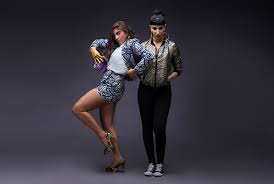Melbourne Music Week not only made every Australian music fan living outside the city incredibly jealous, but it also saw the genesis of an exciting and important new project for Australian music.
The Her Sound, Her Story exhibition was launched on the eve of MMW, a visual presentation which celebrated the efforts of female Australian musicians, who have found themselves under-represented for far too long.
The brainchild of photographer Michelle Grace Hunder and filmmaker Claudia Sangiorgi Dalimore, the project has combined music with the narrative of female musicians in an exhibition featuring portraits and interviews of over 40 Australian female musicians.
Now the project has continued online, with a 12-part video series of documentary-style episodes premiering on Rolling Stone. The videos feature in-depth interviews with their subjects, allowing them to tell their story in their own words. Read on for a brief look at who has been featured in the series so far.
Kasey Chambers
The country singer-songwriter reveals how her nomadic childhood shaped her love for music, as well as how she refused to let her circumstances dictate how she approach her career. “If you want your dream to happen, then you just fucking make it happen.”
Sampa The Great
One of the breakout artists of last year explains how she came to Sydney, as well as what it was like to open the stage for Kendrick Lamar and how she overcame societal expectations of what women should do. “I’d like to see more openness to new things…music isn’t owned by one person.”
Kate Ceberano
Kate recalls how the women surrounding her in the early moments of her career enabled her to push through the difficult aspects of the then patriarchal industry, as well as noting how she has found new freedom with her career. She also muses how “money can really spoil art.”
Nai Palm
The unbelievably talented Hiatus Kaiyote frontwoman Nai talks about her own sense of value when sharing music with others, recalling how a woman wrote to her from Syria to tell her how her music helped her deal with the horrors at home. “It’s not for your validation, it’s for other people. It’s amazing to have a sense of purpose.”
Julia Stone
Known for her work with brother Angus, Julia reveals how she faced insecurities about expressing herself earlier in her career, and how success made her realise that those feelings can only change when you become comfortable with who you are. “This is what I do and I can’t be anything else. It’s okay if you don’t like it and it’s okay if you do like it. It’s all okay.”
Missy Higgins
Speaking against the idea of imagery in music, Higgins recalls how when she started in music she met record executives who wanted to dress her up. She goes on to note how from day one she wanted to be different from others, whether that be through cutting her hair off or choosing to wear jeans over a dress. “Don’t worry about trying to make people like you. It’s okay to be a strong woman.”
Ella Hooper
Ella reveals how Killing Heidi began as a band playing at school events, which then accelerated to playing the main stage at Big Day Out. She also reveals how “pissed off” she was at the way women were treated in the music industry. “All it takes is popping your head out of the window to a different part of the industry and it’s like ‘oh, there’s that gender imbalance, alive and well.'”
Simona Castricum
A major voice in the music industry for the LGBTQI community, Simona recalls how she was worried about being bullied for her identity when she was struggling with coming out, and how she dealt with executives wondering how to sell her as a ‘trans-artist.’ “In order for that entire system to… not be so dominated by misogynist ideas of desirability, there needs to be a structural change.”
Mama Kin
The Fremantle-based artist shares her memories of starting a family band as a child, and how scared she was of judgment and rejection at the hands of the music industry. She goes on to recount the struggle of balancing her desire to create music and her expectations on herself being a mum. “It’s a good time to be a woman, full stop.”
Mojo Juju
Speaking about her experiences within the industry as a queer woman of colour, Mojo voices her concerns over what is acceptable by industry standards when it comes to sexuality and art in general. “People are always trying to figure out who I am, what I am and what I do….and I find that a bit uncomfortable.”
Emma Donovan
The Indigenous singer remembers how she began singing in church and how she developed her gift for singing in her teen years, as well as the influence of Ruby Hunter on her own career. She goes on to reflect on the increasing contribution of indigenous artists on the Australian music scene “There’s so much Aboriginal music from all over this place. The mob has just gotta learn how to tune in.”
Tina Arena
For the final episode of the series, Tina Arena remembers how from an early age she was aware of the gender imbalance in the industry, as well as reminiscing on her own experiences of sexism throughout several decades in Australian music. “Are you going to tell a male, who’s at the top of his game in whatever domain, that he needs to step down and retire?… Ladies in the game, 40 and over, we’ll decide when it is time to retire.”
To see all the videos in the series, head to the project’s official website.
Image: Rolling Stone Australia

